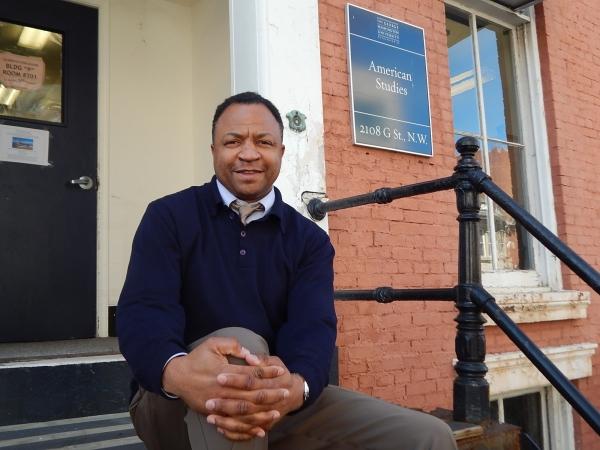Craig Allen receives 2015 Phillip T. Amsterdam Teaching Award
Are there any specific methods of teaching that you employ when you’re in the classroom?
Well, there are usually two kinds of students that I have to deal with. There are students who understand the methods that we employ, here in American Studies, right off the bat. Things such as reading for understanding and meaning within the dialectic. Then there are students who aren’t quite there. For those students, I like to put the reading in a different context. By using pop culture, music, and film to arrive at the material through different angles, students can suddenly grasp Foucault and other challenging texts. It’s great to see.
Have there been any teachers or professors in your life that have inspired you?
Oh yes! My very first teacher was my mother. There is a time when a child is first learning to write, and they learn proper letter and word spacing by using their fingers. I still remember my mother teaching me that. That’s the first of many opportunities that parents have to teach their children, and I vividly remember her teaching me that.
Beyond that, the first name that comes to mind is a professor that I had at the Citadel named Gardel Feurtado. Professor Feurtado was a political science professor who was ex-CIA. He was the first person to take something I had written and proceed to “bleed” all over it. I still have that paper actually. It is red through and through. It’s five pages, but you see the red ink before you see anything else. He was the first person to tell me that he thought I had the potential to write very well, but more importantly, he said, “I expect you to write better.” I got an A- or B+ on the paper, but the comments he wrote were very critical. He told me, “I think you have the talent to do better,” but then challenged me to actually do it. That was the moment where I began to entertain the possibility that reading, writing, and thinking for a living might be possible.
Additionally, there was a professor named December Green, also of The Citadel. Where Dr. Feurtado was the first to invest in me as a writer and thinker, Dr. Green taught me to think critically.
Have you used that sort of method or tried to emulate him in any way when you teach?
Yes! I’m notorious for taking a long time grading written material. Normally, I’m about a week behind everyone else. I have gotten wiser and forewarned students that I’m going to spend that time, but in this day and age of everything going faster and more being expected in less time, I’m asking them to stop what they’re doing, ignore texts, write in a particular space, and push everything to the side. I feel like I owe them at least that much when I grade their work. I hope it’s done in a way that allows them to do what Gardel Feurtado did for me, which is to say “I believe in what you’re doing, I know you can do this, and I’m going to do anything I can to help you get there.”
What’s your favorite subject to teach?
I’ve been surprised by how much I learned from each one of my American Studies courses. It may sound like a cop-out, but I truly can’t pick a favorite. In Every one of the classes for which I’ve TA’d, I’ve gone in the front end with the expectation that I either knew what I was talking about, or I didn’t. In either case, I would come out the other end enriched and having learned quite a bit.
Do you have plans in the future to stay in a teaching role?
My goal is to teach in some capacity at the university level, of course I have my own research interests that make my heart pitter-patter. But nothing makes my heart pitter-patter more than connecting with the young “Craig Allen’s” in my class, whether they are young men or young women. The kid who walks in, maybe with an ounce of interest, but someone for whom you will need to find a different way to make the material resonate with him or her. Once that happens, seeing the light go on in someone who has been struggling….is everything.
What would you like American Studies students and other students to know about college?
There’s a song by Billy Joel from his album, The Stranger called “Vienna.” When you listen to Vienna, I think he is saying what I would like to say, and what I try to say at the very outset of my sections: “calm down…calm down.” I mean that in a couple ways. First, literally - relax so that you can hear. I think the current generation of college student has the toughest assignment of any of us. It’s tougher to be a college student now than ever before. You’re asked to do more in less time and with fewer real opportunities to let anything sink in. You’ve got your iPhones, iPads, you’ve got Mom texting you…I don’t know when you actually sit down and shut everything out, but you have to, or at least try. Part of what I would say is, fight hard to create those spaces to allow yourself to truly take-in, not only the material being offered, but also the context and experience around the learning experience. I think that if you give a student half a chance at that, most will succeed.


